Introduction
The Afghan Hound isn’t just a dog; it’s a statement. A creature out of ancient myth, draped in silk, with an air of regal aloofness and a mischievous glint in its eye. This is the Afghan, a breed that captures hearts with its beauty and baffles minds with its independent spirit.
Originating in the harsh mountains of Afghanistan, these sighthounds were bred for speed and endurance, chasing game across challenging terrain. Today, their allure has transcended their hunting roots. Afghan Hounds are now beloved companions, prized for their elegance, loyalty, and surprising bursts of silliness.
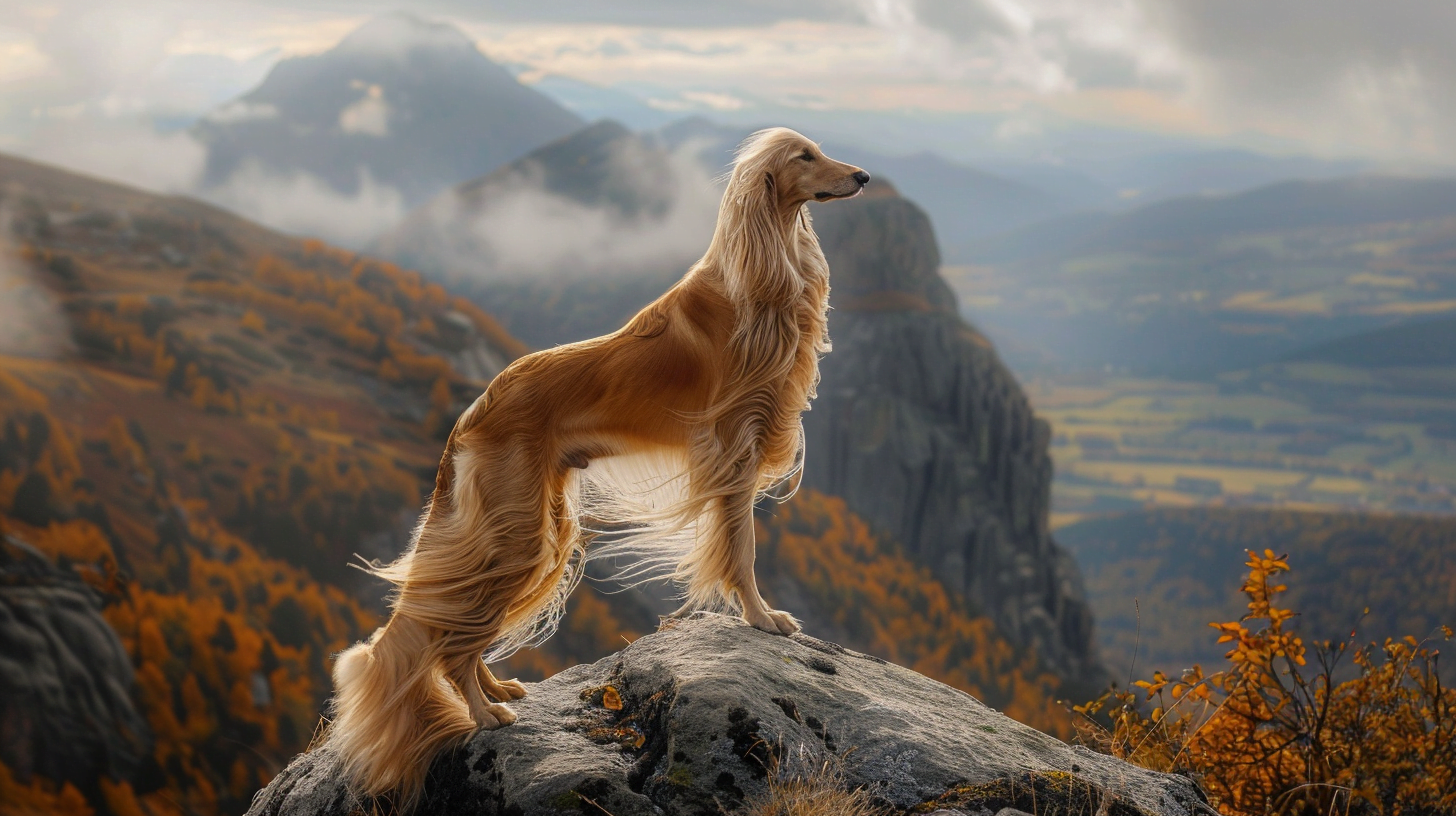
Are you ready to meet the Afghan Hound? Let’s embark on a journey through time, tradition, and temperament, and discover what makes this breed a truly unforgettable companion.
A Journey Through Time: The Afghan Hound’s Ancient Origins
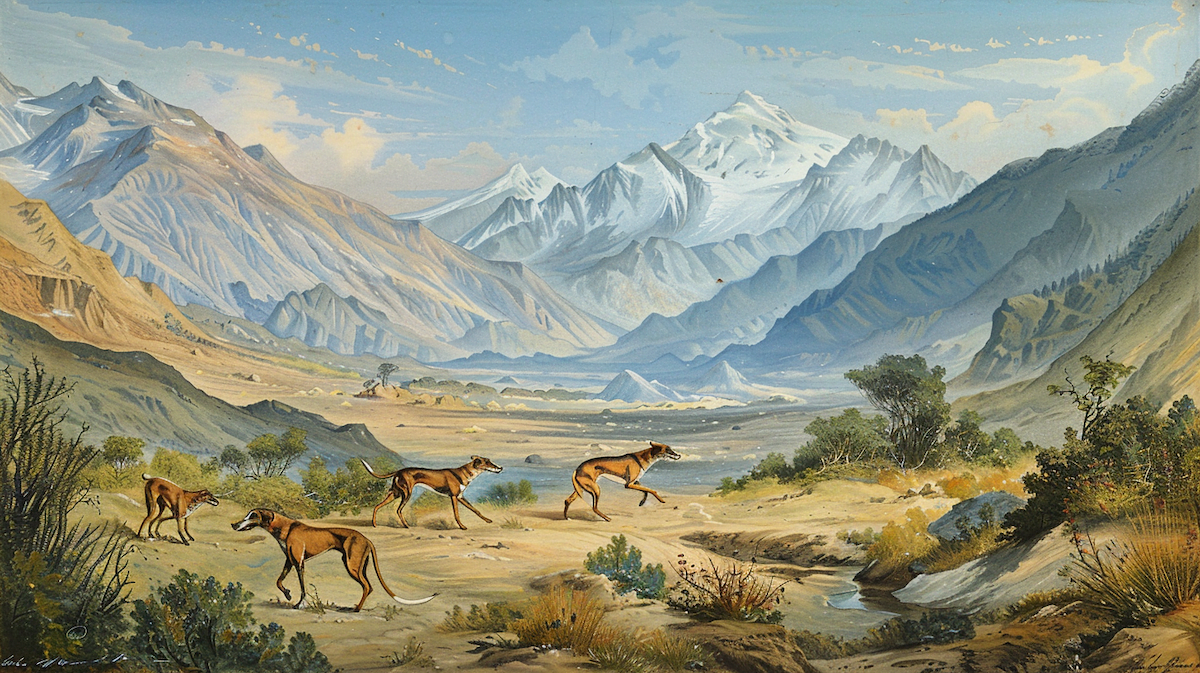
Ancient Roots in the Mountains
The Afghan Hound’s history is as captivating as its appearance. Their story begins thousands of years ago in the rugged terrain of Afghanistan, where they were prized for their exceptional hunting abilities. While precise records are scarce, it’s believed that the breed descended from ancient sighthound types, evolving to thrive in the harsh mountain environments.
A Breed Shaped by Function
The Afghan Hound was not merely a pet; it was a working dog with a crucial role in survival. These agile hunters chased gazelles, leopards, and other swift prey across challenging landscapes. Their long, silky coat, while seemingly impractical for such pursuits, actually served a purpose. It provided insulation against the bitter cold of the Afghan mountains, ensuring the dogs remained comfortable during long hunts.
A Living Relic
Interestingly, the Afghan Hound’s isolated development in the mountains contributed to their unique genetic makeup. They remained relatively untouched by outside influences, resulting in a breed that’s considered a “living relic.” This means their DNA is closer to ancient wolf ancestors than many other dog breeds, making them a fascinating subject for geneticists and a testament to their resilience.
Arrival in the Western World
The Afghan Hound’s journey to the West began in the 19th century when British soldiers stationed in Afghanistan encountered these majestic dogs. Captivated by their exotic beauty and hunting prowess, they brought a few individuals back to England. This marked the beginning of the breed’s rise to international fame.
The Rise of a Show Dog
In the early 20th century, Afghan Hounds made their debut in the dog show world, captivating audiences with their elegance and exotic allure. Their popularity soared, and they became a symbol of luxury and prestige. Today, Afghan Hounds continue to grace the show ring, their flowing coats and regal presence earning them numerous accolades.
The Afghan Hound is not just a beautiful breed; it’s a living testament to thousands of years of evolution and adaptation. Their history is deeply intertwined with the land of their origin, and their journey to the West is a testament to their enduring appeal.
The Afghan Hound’s Distinctive Features
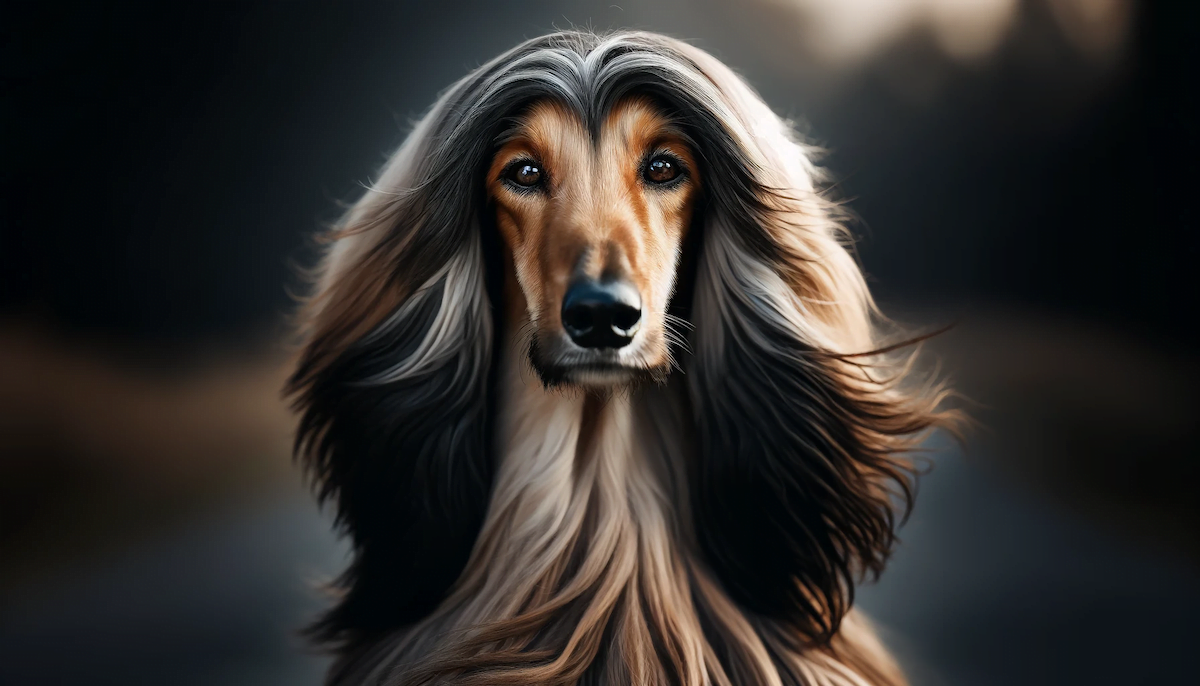
A Coat of Many Colors
The Afghan Hound is undeniably a head-turner. Their most striking feature is their luxurious, flowing coat, which comes in an astonishing variety of colors and patterns. From shimmering golds and rich reds to striking blacks and blues, each Afghan boasts a unique and eye-catching coat.
A Regal Posture
Beyond their flowing locks, Afghan Hounds possess an air of regal elegance. Their tall, slender bodies are built for speed and endurance, with a proud head carriage and a long, feathered tail that curls gracefully over their back. Their almond-shaped eyes, often described as “exotic” or “soulful,” exude a sense of intelligence and aloofness.
Distinctive Breed Characteristics
- Height: Males typically stand 27 inches tall at the shoulder, while females are slightly smaller at around 25 inches.
- Weight: Afghans generally weigh between 50 and 60 pounds.
- Coat: The coat is long, silky, and fine-textured, requiring regular grooming to maintain its beauty and prevent matting.
- Colors: Afghan Hounds come in various colors, including black, blue, cream, fawn, gold, gray, red, silver, and white. They may also have markings such as a black mask or a “widow’s peak” on the forehead.
The Art of Afghan Grooming
Maintaining an Afghan Hound’s coat is no small feat. Regular brushing and bathing are essential to prevent tangles and mats. Many owners opt for professional grooming services to ensure their Afghan’s coat remains in top condition.
The Afghan Hound’s unique appearance is a result of centuries of adaptation to their environment and selective breeding. While their beauty is undeniable, it’s important to remember that their luxurious coat requires significant care and maintenance.
The Afghan Hound’s Personality
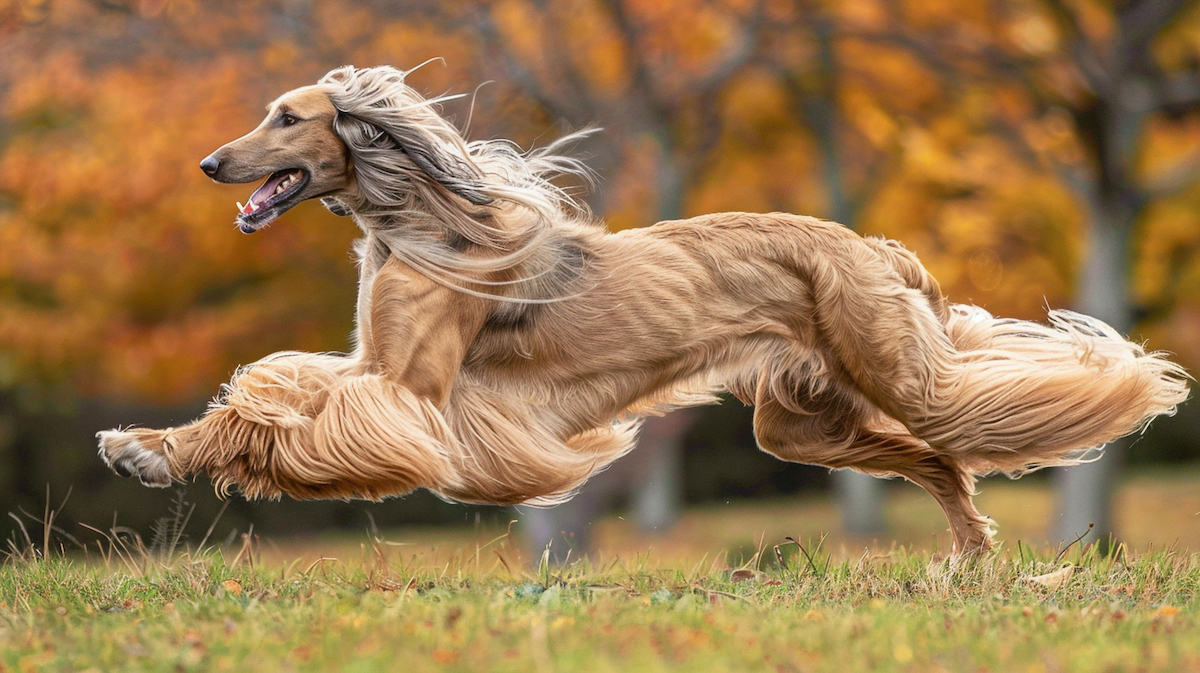
Dignified, Aloof, and Surprisingly Silly
Describing an Afghan Hound’s personality is like trying to capture a gust of wind-captivating, unpredictable, and sometimes utterly baffling. They are known for their regal aloofness, often giving the impression of being in a world of their own. Yet, beneath that dignified exterior lies a playful, even clownish, nature. One moment they might be strutting like royalty, and the next, they could be rolling on their backs with a goofy grin.
Independent Thinkers
Afghan Hounds are not the type to blindly follow orders. They are independent thinkers, bred to make decisions on their own while hunting. This independent streak can be a challenge for novice owners, but it’s also part of what makes them so endearing. Their stubbornness can be frustrating, but it’s also a testament to their intelligence and strong will.
Loyalty Beneath the Aloofness
Despite their aloof demeanor, Afghan Hounds are deeply loyal to their families. They may not be overly demonstrative, but they form strong bonds with their loved ones. They are often described as “cat-like” in their affection, offering subtle displays of love and devotion.
A Breed of Contradictions
Afghan Hounds are a study in contrasts. They are fiercely independent yet deeply loyal, dignified yet silly, brave yet sometimes timid. Understanding and appreciating these contradictions is key to living harmoniously with an Afghan.
Training and Socialization: A Delicate Balance
Training an Afghan Hound requires patience, consistency, and positive reinforcement. They are sensitive souls who do not respond well to harsh methods. Early socialization is crucial to prevent them from becoming overly shy or fearful of strangers. With the right approach, Afghan Hounds can be taught basic obedience commands and even participate in dog sports like lure coursing, where their natural speed and agility shine.
Afghan Hounds are not your average lapdogs. They are independent spirits with a unique blend of dignity and silliness. Their aloof nature can be challenging, but their loyalty and affection make them cherished companions for those who understand and appreciate their quirks.
Living with an Afghan Hound
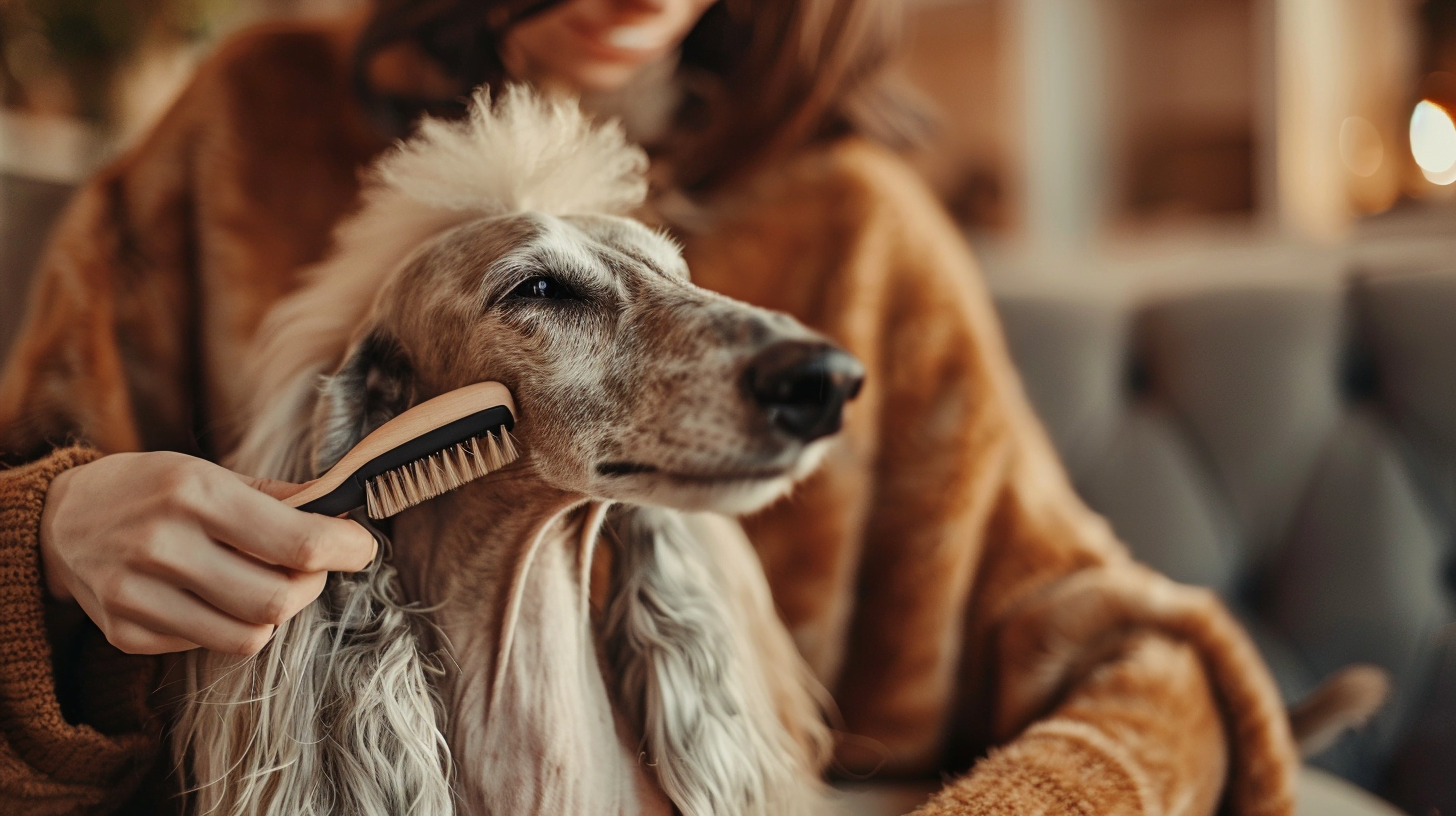
More Than Just a Pretty Face
The Afghan Hound’s striking beauty is undeniable, but owning one is more than just admiring their elegance. These dogs have specific needs that potential owners must understand before bringing one into their homes. It’s a commitment that requires dedication, patience, and a whole lot of love.
Grooming: A Labor of Love
An Afghan’s magnificent coat is a double-edged sword. While it’s a sight to behold, it also demands significant upkeep. Daily brushing is non-negotiable to prevent mats and tangles, which can quickly become painful and lead to skin problems. Regular baths with specialized shampoos and conditioners are also necessary to keep the coat clean and healthy. Many Afghan owners invest in professional grooming to ensure their dog’s coat remains in pristine condition.
Exercise: Channeling That Sighthound Energy
As sighthounds, Afghan Hounds were bred for chasing prey over long distances. While they may seem relaxed and dignified at home, they have a surprising amount of energy that needs an outlet. Daily exercise is crucial for their physical and mental well-being. A fenced-in yard where they can safely run and play is ideal, but long walks or jogs on leash are also essential.
Nutrition: Fueling the Fire Within
Afghan Hounds are active dogs with specific dietary needs. High-quality dog food formulated for large breeds is recommended. Be sure to adjust the amount of food based on your dog’s age, activity level, and metabolism. Avoid overfeeding, as obesity can exacerbate joint problems and other health issues.
Training: Patience and Positive Reinforcement
Afghan Hounds are intelligent but independent-minded, which can make training a bit of a challenge. They are sensitive dogs who do not respond well to harsh methods. Positive reinforcement, such as treats and praise, is the most effective way to motivate them. Patience and consistency are key, as training an Afghan requires a gentle touch and a willingness to adapt to their unique personality.
Health Considerations
While generally healthy, Afghan Hounds are prone to certain health issues. These can include:
- Hypothyroidism: A condition in which the thyroid gland does not produce enough thyroid hormone.
- Cataracts: A clouding of the lens of the eye that can lead to vision loss.
- Allergies: Afghan Hounds can be prone to allergies, which can cause skin irritation and other problems.
- Gastric Dilatation-Volvulus (GDV): Also known as bloat, this is a life-threatening condition that affects deep-chested dogs.
Regular veterinary checkups are essential to monitor your Afghan Hound’s health and catch any potential problems early on.
Is an Afghan Hound Right for You?
Owning an Afghan Hound is not for everyone. They are not the easiest dogs to train or groom, and their independent nature can be frustrating at times. However, for those who are willing to invest the time and effort, Afghan Hounds can be incredibly rewarding companions. They are loyal, loving, and full of personality.
Conclusion
If you’re seeking a dog who will challenge you, make you laugh, and turn heads wherever you go, the Afghan Hound may be the perfect breed for you. But remember, owning an Afghan is a commitment – one that requires patience, understanding, and a whole lot of love.
So, are you ready to welcome an Afghan Hound into your heart and home? If so, prepare to embark on a journey of a lifetime with a four-legged friend who will forever hold a special place in your heart.
FAQs
What is the Afghan Hound’s typical lifespan, and are there specific health concerns I should be aware of?
Afghan Hounds generally live between 12 and 14 years. While relatively healthy, they can be prone to certain conditions like hypothyroidism, cataracts, allergies, and bloat. Regular vet checkups and a healthy lifestyle can help mitigate these risks.
Do Afghan Hounds shed a lot despite their long hair? Are they suitable for allergy sufferers?
Surprisingly, Afghan Hounds shed relatively little despite their luxurious coat. Their hair is similar to human hair in texture and growth cycle. While no dog is truly hypoallergenic, Afghans are considered a better choice for those with mild allergies.
How much exercise does an Afghan Hound truly need? Is a large yard enough, or do they require more structured activities?
While a large, securely fenced yard is ideal for Afghan Hounds to run and play, they also need daily structured exercise like walks, jogging, or lure coursing (simulated hunting). Mental stimulation through games and training is equally important to prevent boredom.
What makes Afghan Hounds’ training different from other breeds? Can they be trained for obedience despite their independent nature?
Afghan Hounds are intelligent but known for their independent streak, making training a unique challenge. They respond best to positive reinforcement and require patience and consistency. While not known for competitive obedience, they can learn basic commands and even excel in sports like agility or lure coursing.
Are Afghan Hounds good with children or other pets? What’s their temperament like in a family setting?
Afghan Hounds can be gentle and affectionate with their family, including children. However, early socialization is crucial, as their independent nature may lead to aloofness if not properly introduced to various people and situations. They may have a high prey drive, so caution is needed around smaller pets.

I could talk about dog breeds all day! My goal is to help you find the four-legged friend who fits your life like a perfectly worn-in tennis ball fits in a dog’s mouth.
